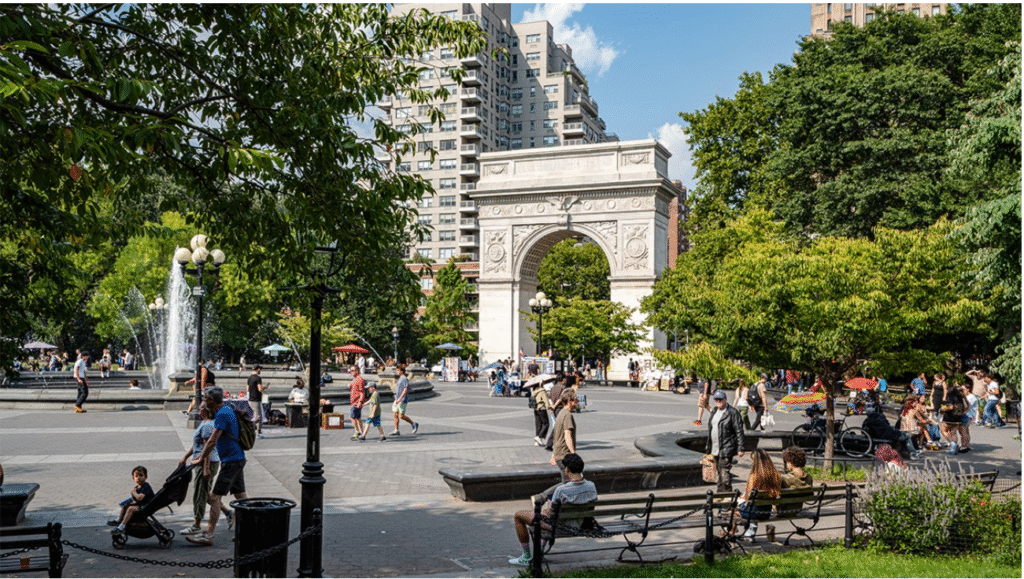NEW YORK — Federal prosecutors in Manhattan unsealed charges today against 19 people who they said ran a year-round open-air drug market in Washington Square Park, distributing millions of doses of fentanyl, heroin and crack cocaine.
During the past five years, a federal indictment said, the police and emergency medical personnel responded to more than 65 reports of apparent drug overdoses in the Greenwich Village park and nearby neighborhoods. Prosecutors said the park, with its arch, three playgrounds and chess tables, had become strewed with used syringes, needles and drug packaging.
In one six-month span last year, the indictment said, two people died of overdoses caused by fentanyl and its analogues, including an 18-year-old days after graduating from high school in Aspen, Colo., who had come to New York City for a prestigious theater internship, and a 43-year-old, who had been homeless and had lived in the park for years.
In a separate case, the authorities on Thursday unsealed charges against five people who ran a different criminal network, distributing thousands of counterfeit opioid pills laced with fentanyl, causing the overdose deaths of three 19-year-olds. One victim was the grandson of the actor Robert De Niro, according to a law enforcement official briefed on the case.
Taken together, the indictments were meant to hold dealers responsible for a few of the thousands of drug deaths in New York. Overdoses were responsible for 3,000 deaths in 2023 alone, prosecutors said, and many of the victims were teenagers.
Built in 1871, Washington Square Park has long been an oasis for protest movements and street artists in the heart of the Greenwich Village neighborhood in Lower Manhattan. In good weather, the park plays host to a daylong spectacle of music, crowds and vendors, some of whose wares are illegal. Drug users openly smoke and inject themselves in more obscure corners of the expansive space.
Prosecutors said the park’s drug network operated as a sophisticated collective to distribute opioids, including by color-coding different packages, tipping members off to the presence of law enforcement and sharing workers.
The indictment, filed in Federal District Court in Manhattan, charges the defendants with conspiracy to distribute narcotics resulting in death. There would have been more overdoses, prosecutors said, if not for advocacy groups providing Narcan to users.
The defendants, according to the indictment, have collectively been arrested at least 80 times for drug-related offenses since 2020.
The network primarily consisted of two groups, prosecutors said, including a subset of the Bloods gang and a team of dealers led by John Livigni, a man who has dealt drugs in the park for around 25 years.
The Bloods and Livigni’s group had an agreement not to sell in each other’s territories — which included different subway stations — and they sold their drugs at different prices. Many of the Bloods dealers were also customers, prosecutors said, while Livigni relied on a team of managers who worked in shifts.
Livigni’s lawyer could not immediately be identified.
The first of the two fatal overdoses occurred in June 2024, when the 18-year-old bought drugs from one of the sellers, and the two used some of the product together, prosecutors in the U.S. attorney’s office in Manhattan said in a memo asking a judge to order all 19 men detained pending trial.
The next day, June 4, the 18-year-old was found dead in a Manhattan apartment. Ripped-up pieces of purple bags that later tested positive for fentanyl, its analogues and heroin lay on a table in a bedroom, along with other drug paraphernalia.
The 43-year-old victim was found on a sidewalk on November 24, 2024, next to a needle, bags of crack cocaine and empty bags that bore the markings of the groups that sold drugs inside the park.
On the damp Thursday morning the indictments were unsealed, the area around Washington Square Park was comparatively quiet and clean. The west side of the park by the chess tables, where prosecutors say many transactions took place, was empty of people other than those rushing through with their umbrellas.
When Mohammed Alam, 61, started operating a newsstand on a corner of the park more than 24 years ago, vendors used to sell books from tables they had set up down Sixth Avenue, he said. In recent years, he said he had noticed more people either using or selling drugs on his block.
Alam recounted seeing some of the dealers selling drugs just by his newsstand. One man, standing to the side, would crumple a small piece of paper containing drugs and toss them on the ground, away from him. Then, the buyer would pick up the crumpled paper, walk over to another person and hand them cash.
Alam worried that the drug dealing had hurt businesses on his block, and said that he had placed a camera to “scare” one of the dealers away.
“I see so many,” Alam said. “Sometimes they move, for half an hour, and then they come back.”
By BENJAMIN WEISER and SANTUL NERKAR/New York Times
Olivia Bensimon contributed reporting.
Benjamin Weiser is a Times reporter covering the federal courts and U.S. attorney’s office in Manhattan, and the justice system more broadly.
Santul Nerkar is a Times reporter covering federal courts in Brooklyn.

